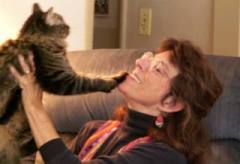Frances Ruhlen McConnel
I wrote haiku when I was young and then despaired of the form in English. A few years ago I fell in love with Jack Kerouac's Book of Haikus, published in 2003. His haiku seemed so full of wit and emotion--reading them was a whole new experience. Since then I have published a number of haiku and have had a number rejected because editors considered them to have "too much mind." Okay, I can accept that. I don't think the farmer's market haiku suffers from that, but it should feel amusing--all that wonderful variety of summer veggies simmered down to and mirrored in the variously colored and shaped humble squash. "Loveless nights" has more complexity than a haiku ought, if one is a purist about it, the "twittering" of the fan suggesting, at least to me, the absence of bird serenades we get in the spring and early summer. Mating season, sadly, is no longer with us. But I don't want to interpret it. I started writing haiku again because the rules for writing haiku in English had become more flexible. No need of the 7,5,7 rigidity. You can do a haiku in 3,2, or even 1 line. Also I started writing them because a friend and brilliant reader of poems had suffered a stroke and was having difficulty with longer poems.
The double sonnet came out of my fascination with Marilyn Hacker's linked sonnets. I wanted to go on, but the second one seemed to resolve itself with a finality I couldn't ignore. The first sonnet is about teenage sex, kind of, and the second about becoming a grandmother. I'm not sure if they are linked strongly enough. My paternal grandmother came into the first one because I was thinking of myself as a teenager compared to her--the last time I saw her she was a little older than I am now and was suffering from dementia. Then I thought I needed to include my maternal grandmother, who lived with my family until we moved to Alaska when I was 12. Teenage life, including sex, brought on "out of sight, out of mind," which I deeply regretted long before I became a grandmother myself--at 46.
The sonnet is a form that sums up experience and I hoped it would help me do that.
___________________________________________
Double Sonnet on the Occasion of My Granddaughter’s
Viewing of Her First Sex Education Film
Sixteen, talking in bed, my last trip to the farm
So far from Alaska , I asked Grandma Ruhlen
About Paul’s youth. She told me how he once charmed
A neighbor girl, hot-rodding their tractor. (Kissing-Cousin
Paul, the Air Force flyer whose mouth had opened like a furnace
Upon my own, hurling me light years from the hawk-pecks
Of my boy friend.) Ending her story, Grandma re-traced
It again, her laugh, a demented crone’s cackle
Warning of God knows what hot reckoning
Love got you into. That mesmerizing voice I’d disavow
As soon as I could, a crooked finger beckoning
To what witch’s den? Is it my voice now?
And I wonder how soon I’ll join my mateys—
The dotty, the gnarled, the petrifying old ladies.
Or the grand, the dear, the doting, like Nana Smith
Whom Daddy called “Miss Agnes,” her voice faded
Even as she spoke—the Southern summer’s breath
We left so far behind. White, nubby bedspread.
A radio sermon’s crackle and boom. Gray
Hairpins in an abalone shell. Fat fingers
Threading my own to the crochet hook. At eight-
Teen I groaned at her postscripts where she wondered
How long before she’d end up in a home.
She died eight years away. Family love is
A great gulp of nutrient tears, humble
And slow-rising through roots and trunk and boughs.
Or is it like an ax?
Darlings at my knee:
To what dimension will you exile me?
Four Haiku
In the orchard, small green apples fall;
Jean, on her new hip, climbs the stairs.
loveless dog-days:
night-long twittering
of the ceiling fan
October
in the farmer’s market:
six kinds of squash
pale communion wafer
half-dissolved in blue blaze:
afternoon moon
_________________

Frances Ruhlen McConnel lives in Claremont, California. She taught in the Creative Writing Department at UC Riverside for many years. Her new book of poems, The Direction of Longing, is due out from Bellowing Ark press in July, 2007. She also has a chapbook of haiku and other short poems published in 2006 by the Alaskan Bucket of Type Printery, white birches, black water and a full-length collection from Pygmalion Press, Gathering Light. For Pygmalion Press, she also edited an anthology of West Coast women poetry, One Step Closer. Both of these were in the late 70s. Her poetry, fiction, and essays have appeared widely in anthologies as well as magazines and journals including The Atlantic Monthly, The Massachusetts Review, The Pedestal, The Seattle Review, The Alaska Quarterly Review, The Iowa Review, Square Lake, Pearl and Crab Creek Review. She won the Oneiros Press National Broadside Conest in 2004. She is presently working on a novel.